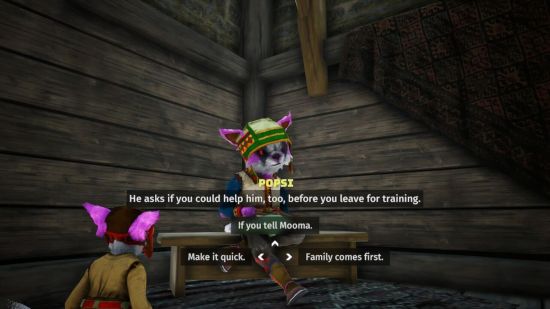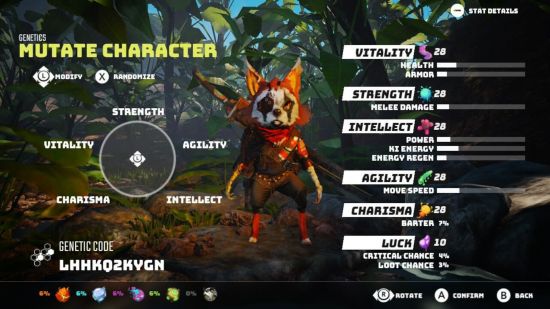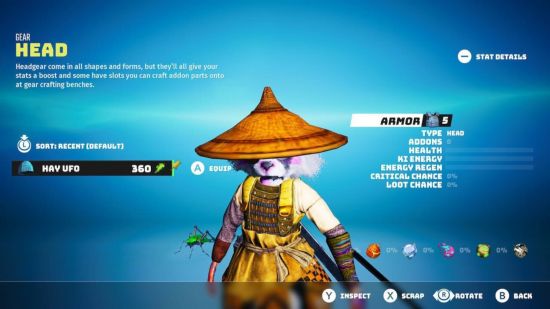Our Verdict
Biomutant’s vibrant, post-apocalyptic setting simply does not translate to the Nintendo Switch. Pair this with convoluted combat, shallow morality systems, and a suspect blending of Asian cultures, and you get a very unenjoyable gameplay experience.
Who doesn’t love a post-apocalyptic game? At least, that’s what I thought when I heard about the Biomutant Switch port. Biomutant is a game that I’ve never encountered before in my gaming adventures on PC and consoles, so the arrival of this port felt like the perfect time to give it a go.
For the uninitiated, Biomutant is Experiment 101’s open-world post-apocalyptic ARPG published by THQ Nordic. It initially launched in 2021 and this year’s Switch port is the final piece of the puzzle, making the game available on all home consoles. You play as a mutated, enhanced mammal traveling across a humanless world, working to save the Tree of Life and, in turn, save the world.
From this description, I was immediately on board. I love a choice game with dire consequences – games like Life is Strange or The Cosmic Wheel Sisterhood. The combat and customization appealed to my interests too, and I generally think that dystopias and post-apocalyptic settings provide a brilliant backdrop for some hard-hitting, emotional, and political storytelling in videogames. Sadly, my hopes were quickly dashed.
To be fair, these hopes were set a little too high for a game that has almost universally received mixed and average reviews across both PC and consoles. Most Metacritic entries echo each other, saying the game is beautiful but lacks substance. It’s built on great ideas that never come to fruition. I have to say that I agree, with the added caveat that on the Nintendo Switch – even on my brand-new OLED – Biomutant’s surface-level story and needlessly complex combat can’t even lean on stellar graphics.
It’s something of a running gag that many modern games with hyperrealistic or detailed graphics won’t make the jump to Nintendo’s hybrid console for fear of losing graphical fidelity. Those that have made the leap – ahem, Mortal Kombat 1 – are often riddled with bugs and look horrendous. Biomutant suffers the same fate. When I wrote about Biomutant’s Switch release date, the beautiful screenshots on the official website won me over. Of course, I expected a slight downgrade for the Switch, especially in handheld mode, but the difference frankly borders on false advertising.
The choice-based aspect of Biomutant is also severely lacking. Most games with multiple endings or karmic morality systems operate on a spectrum – heck, even Undertale does it! This game’s morality system is incredibly shallow and black-and-white, so much so that the physical incarnations of ‘Light’ and ‘Dark’ are a pair of black and white miniature dragons. The first major choice you make is about forming an alliance with one of two tribes, the Myriad and the Jagmi. The game boils these peoples’ beliefs and morals down to three points: their core desire, their feelings about the other tribes, and what we should do about the Tree of Life.
Choosing the light side, we’re told that the Myriad are a fair people who want to unite the tribes and save the Tree, whereas the Jagmi want to conquer the tribes and leave the Tree to the destruction of the Worldeaters. If you’re playing a ‘good’ character, the choice is obvious, right? My character is allied with the Myriad because I hate playing evil characters in games, but after I accepted their alliance, I realized that this choice-based game had somehow provided me with the illusion of choice, similar to a Pokémon game. Biomutant tells you that you must unite the tribes through conversation, or if necessary, by force. Isn’t that the same thing as conquering them?
As well as a lack of nuance, Biomutant’s major choices directly tell you their implications ahead of your decision, which I personally think completely ruins the appeal of a choice game. Sure, tell me that a character ‘will remember this’ or ‘this action will have consequences’, but don’t tell me the entire trajectory of the story from this point forward! I appreciate that this would make a great option to turn on for completionists searching for specific endings, or as an accessibility feature, but it shouldn’t be the default.
I’ve alluded to it already, but I think Biomutant’s combat is far too complex in the early game, especially for how unreliable the controls themselves are. You start your adventure by choosing a character class, which decides the kinds of weapons you use. I wanted to avoid ranged weapons as much as possible as my joystick aim is abysmal, but each of the six classes use both guns and melee weapons.
The opening combat tutorial shows you every single combo available for both your melee and ranged weapon in quick succession, and then expects you to remember and master them immediately, because very soon after you get to unlock even more combos. I’m playing this game on easy mode but I’m still struggling. Combining multi-button, fighting game-style combos with twin-stick movement and camera control is convoluted and inaccessible for a lot of people, myself included.
As someone who plays a lot of political games and likes to uplift titles which excel at cultural representation, Biomutant’s orientalist culture-mashing is painful to experience. I’m not the most well-versed in the topic as it’s a very complex academic field, but put simply, orientalism is what it’s called when Western people essentialize Asian and SWANA (Southwest Asian and North African) cultures into stereotypes. Biomutant messily blends aspects of Japanese, Chinese, and other cultures together to create a ‘mystical’ atmosphere that comes across as mocking and disrespectful. The main combat style is even called Wung Fu – a style that doesn’t exist and is a blatant rip-off of kung fu. In 2024, and even in 2021 when Experiment 101 first released the game, this shouldn’t still be happening.
My final gripe is with the narrator. Don’t get me wrong, he’s a very talented man, but his voice simply doesn’t fit the genre or setting, making the already confusing atmosphere even harder to engage with. David Shaw Parker previously narrated the Mr Men, Little Misses cartoon series, which is a core memory for a lot of British kids raised in the 90s and 00s – including myself – so his voice just screams children’s show to me. His narration is similar to the narrator in The Stanley Parable too, which makes it hard to know how seriously I should be taking the story.
Overall, I wouldn’t recommend playing Biomutant on the Switch. You might have a better time on another console or PC, especially if you’re proficient at fighting games and ranged combat, but frankly I think other games have tackled this topic in a much more nuanced way.
If you’re still in the mood for an alternative future, check out our list of great post-apocalyptic games on Switch and mobile. We’ve also got a comprehensive guide to the best ARPGs on both platforms.



